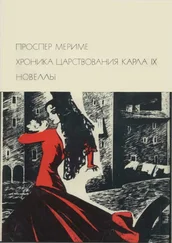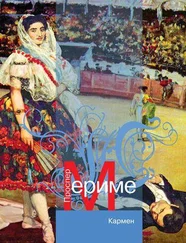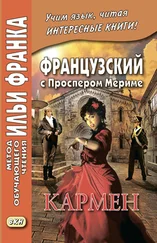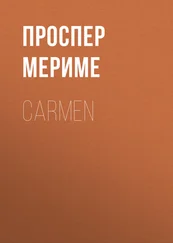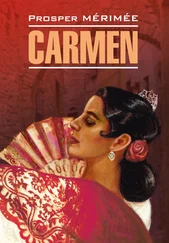Проспер Мериме - Colomba
Здесь есть возможность читать онлайн «Проспер Мериме - Colomba» — ознакомительный отрывок электронной книги совершенно бесплатно, а после прочтения отрывка купить полную версию. В некоторых случаях можно слушать аудио, скачать через торрент в формате fb2 и присутствует краткое содержание. Жанр: literature_19, foreign_antique, foreign_prose, Зарубежные любовные романы, на английском языке. Описание произведения, (предисловие) а так же отзывы посетителей доступны на портале библиотеки ЛибКат.
- Название:Colomba
- Автор:
- Жанр:
- Год:неизвестен
- ISBN:нет данных
- Рейтинг книги:3 / 5. Голосов: 1
-
Избранное:Добавить в избранное
- Отзывы:
-
Ваша оценка:
- 60
- 1
- 2
- 3
- 4
- 5
Colomba: краткое содержание, описание и аннотация
Предлагаем к чтению аннотацию, описание, краткое содержание или предисловие (зависит от того, что написал сам автор книги «Colomba»). Если вы не нашли необходимую информацию о книге — напишите в комментариях, мы постараемся отыскать её.
Colomba — читать онлайн ознакомительный отрывок
Ниже представлен текст книги, разбитый по страницам. Система сохранения места последней прочитанной страницы, позволяет с удобством читать онлайн бесплатно книгу «Colomba», без необходимости каждый раз заново искать на чём Вы остановились. Поставьте закладку, и сможете в любой момент перейти на страницу, на которой закончили чтение.
Интервал:
Закладка:
. . . “Neither cannon nor bayonets . . . Brought pallor to his brow. . . As serene on the battlefield . . . as a summer sky. He was the falcon—the eagle’s friend . . . Honey of the sand to his friends . . . To his enemies, a tempestuous sea. . . . . . . Prouder than the sun . . . gentler than the moon . . . He for whom the enemies of France . . . never waited . . . Murderers in his own land . . . struck him from behind . . . As Vittolo slew Sampiero Corso . . . Never would they have dared to look him in The face . . . Set up on the wall Before my bed . . . my well-earned cross of honour . . . red is its ribbon . . . redder is my shirt! . . . For my son, my son in a far country . . . keep my cross and my blood-stained shirt! . . .
“. . . He will see two holes in it . . . For each hole a hole in another shirt! . . . But will that accomplish the vengeance? . . . I must have the hand that fired, the eye that aimed . . . the heart that planned!” . . .
Suddenly the sailor stopped short.
“Why don’t you go on, my good man?” inquired Miss Nevil.
The sailor, with a jerk of his head, pointed to a figure appearing through the main hatchway of the schooner: it was Orso, coming up to enjoy the moonlight. “Pray finish your song,” said Miss Lydia. “It interests me greatly!”
The sailor leaned toward her, and said, in a very low tone, “I don’t give the rimbecco to anybody!”
“The what?”
The sailor, without replying, began to whistle.
“I have caught you admiring our Mediterranean, Miss Nevil,” said Orso, coming toward her. “You must allow you never see a moon like this anywhere else!”
“I was not looking at it, I was altogether occupied in studying Corsican. That sailor, who has been singing a most tragic dirge, stopped short at the most interesting point.”
The sailor bent down, as if to see the compass more clearly, and tugged sharply at Miss Nevil’s fur cloak. It was quite evident his lament could not be sung before Lieutenant Orso.
“What were you singing, Paolo France?” said Orso. “Was it a ballata or a vocero ? Mademoiselle understands you, and would like to hear the end.”
“I have forgotten it, Ors’ Anton’,” said the sailor.
And instantly he began a hymn to the Virgin, at the top of his voice.
Miss Lydia listened absent-mindedly to the hymn, and did not press the singer any further—though she was quite resolved, in her own mind, to find out the meaning of the riddle later. But her maid, who, being a Florentine, could not understand the Corsican dialect any better than her mistress, was as eager as Miss Lydia for information, and, turning to Orso, before the English lady could warn her by a nudge, she said: “Captain what does giving the rimbecco mean?”
“The rimbecco!” said Orso. “Why, it’s the most deadly insult that can be offered to a Corsican. It means reproaching him with not having avenged his wrong. Who mentioned the rimbecco to you?”
“Yesterday, at Marseilles,” replied Miss Lydia hurriedly, “the captain of the schooner used the word.”
“And whom was he talking about?” inquired Orso eagerly.
“Oh, he was telling us some odd story about the time—yes, I think it was about Vannina d’Ornano.”
“I suppose, mademoiselle, that Vannina’s death has not inspired you with any great love for our national hero, the brave Sampiero?”
“But do you think his conduct was so very heroic?”
“The excuse for his crime lies in the savage customs of the period. And then Sampiero was waging deadly war against the Genoese. What confidence could his fellow-countrymen have felt in him if he had not punished his wife, who tried to treat with Genoa?”
“Vannina,” said the sailor, “had started off without her husband’s leave. Sampiero did quite right to wring her neck!”
“But,” said Miss Lydia, “it was to save her husband, it was out of love for him, that she was going to ask his pardon from the Genoese.”
“To ask his pardon was to degrade him!” exclaimed Orso.
“And then to kill her himself!” said Miss Lydia. “What a monster he must have been!”
“You know she begged as a favour that she might die by his hand. What about Othello, mademoiselle, do you look on him, too, as a monster?”
“There is a difference; he was jealous. Sampiero was only vain!”
“And after all is not jealousy a kind of vanity? It is the vanity of love; will you not excuse it on account of its motive?”
Miss Lydia looked at him with an air of great dignity, and turning to the sailor, inquired when the schooner would reach port.
“The day after to-morrow,” said he, “if the wind holds.”
“I wish Ajaccio were in sight already, for I am sick of this ship.” She rose, took her maid’s arm, and walked a few paces on the deck. Orso stood motionless beside the helm, not knowing whether he had better walk beside her, or end a conversation which seemed displeasing to her.
“Blood of the Madonna, what a handsome girl!” said the sailor. “If every flea in my bed were like her, I shouldn’t complain of their biting me!”
Miss Lydia may possibly have overheard this artless praise of her beauty and been startled by it; for she went below almost immediately. Shortly after Orso also retired. As soon as he had left the deck the maid reappeared, and, having cross-questioned the sailor, carried back the following information to her mistress. The ballata which had been broken off on Orso’s appearance had been composed on the occasion of the death of his father, Colonel della Rebbia, who had been murdered two years previously. The sailor had no doubt at all that Orso was coming back to Corsica per fare la vendetta , such was his expression, and he affirmed that before long there would be fresh meat to be seen in the village of Pietranera. This national expression, being interpreted, meant that Signor Orso proposed to murder two or three individuals suspected of having assassinated his father—individuals who had, indeed, been prosecuted on that account, but had come out of the trial as white as snow, for they were hand and glove with the judges, lawyers, prefect, and gendarmes.
“There is no justice in Corsica,” added the sailor, “and I put much more faith in a good gun than in a judge of the Royal Court. If a man has an enemy he must choose one of the three S’s.” (A national expression meaning schioppetto , stiletto , strada —that is, gun , dagger , or flight .)
These interesting pieces of information wrought a notable change in Miss Lydia’s manner and feeling with regard to Lieutenant della Rebbia. From that moment he became a person of importance in the romantic Englishwoman’s eyes.
His careless air, his frank and good humour, which had at first impressed her so unfavourably, now seemed to her an additional merit, as being proofs of the deep dissimulation of a strong nature, which will not allow any inner feeling to appear upon the surface. Orso seemed to her a sort of Fieschi, who hid mighty designs under an appearance of frivolity, and, though it is less noble to kill a few rascals than to free one’s country, still a fine deed of vengeance is a fine thing, and besides, women are rather glad to find their hero is not a politician. Then Miss Nevil remarked for the first time that the young lieutenant had large eyes, white teeth, an elegant figure, that he was well-educated, and possessed the habits of good society. During the following day she talked to him frequently, and found his conversation interesting. He was asked many questions about his own country, and described it well. Corsica, which he had left when young, to go first to college, and then to the Ecole militaire, had remained in his imagination surrounded with poetic associations. When he talked of its mountains, its forests, and the quaint customs of its inhabitants he grew eager and animated. As may be imagined, the word vengeance occurred more than once in the stories he told—for it is impossible to speak of the Corsicans without either attacking or justifying their proverbial passion. Orso somewhat surprised Miss Nevil by his general condemnation of the undying hatreds nursed by his fellow-countrymen. As regarded the peasants, however, he endeavoured to excuse them, and claimed that the vendetta is the poor man’s duel. “So true is this,” he said, “that no assassination takes place till a formal challenge has been delivered. ‘Be on your guard yourself, I am on mine!’ are the sacramental words exchanged, from time immemorial, between two enemies, before they begin to lie in wait for each other. There are more assassinations among us,” he added, “than anywhere else. But you will never discover an ignoble cause for any of these crimes. We have many murderers, it is true, but not a single thief.”
Читать дальшеИнтервал:
Закладка:
Похожие книги на «Colomba»
Представляем Вашему вниманию похожие книги на «Colomba» списком для выбора. Мы отобрали схожую по названию и смыслу литературу в надежде предоставить читателям больше вариантов отыскать новые, интересные, ещё непрочитанные произведения.
Обсуждение, отзывы о книге «Colomba» и просто собственные мнения читателей. Оставьте ваши комментарии, напишите, что Вы думаете о произведении, его смысле или главных героях. Укажите что конкретно понравилось, а что нет, и почему Вы так считаете.

